Minimal design thoughts
-
Sounds very interesting! Though personally I'd rather have a good regulator / boost (even if it is in a separate module) than having to source particular components that will run at 1.8V.
How do you plan to integrate the nrf24? The "standard" or the "mini" version?
I would love it if the MySensors web site could have a department of open source pcb schematics just like it has models for 3D printing.
Soldering sounds tricky, you'd either have to reflow or heat the underside of the DFN6 on the pcb. With extra flux and paste.
@bjornhallberg said:
I would love it if the MySensors web site could have a department of open source pcb schematics just like it has models for 3D printing.
Yes, I would gladly create a section for this on the main site. But maybe we could start a pinned thread linking the once available?
-
Yes there is a TGnd Pad in the middle :
http://www.silabs.com/Support Documents/TechnicalDocs/Si7021.pdf
page 26... But I'll buy a Hot Air soldering station, i'll be easier to solder no?@Tibus Or perhaps you have a hot air gun in the toolbox. Not as elegant but it might do.
I'd much rather not try hot air (only have this at my disposal) and instead try to get at the pad from the backside of the pcb:
http://www.eevblog.com/forum/projects/soldering-dfn-and-qfn-devices/
With flux and paste possibly it should be quite easy. And besides, you'd need flux and/or paste for hot air reflow as well. -
Schematic as it is at the moment:
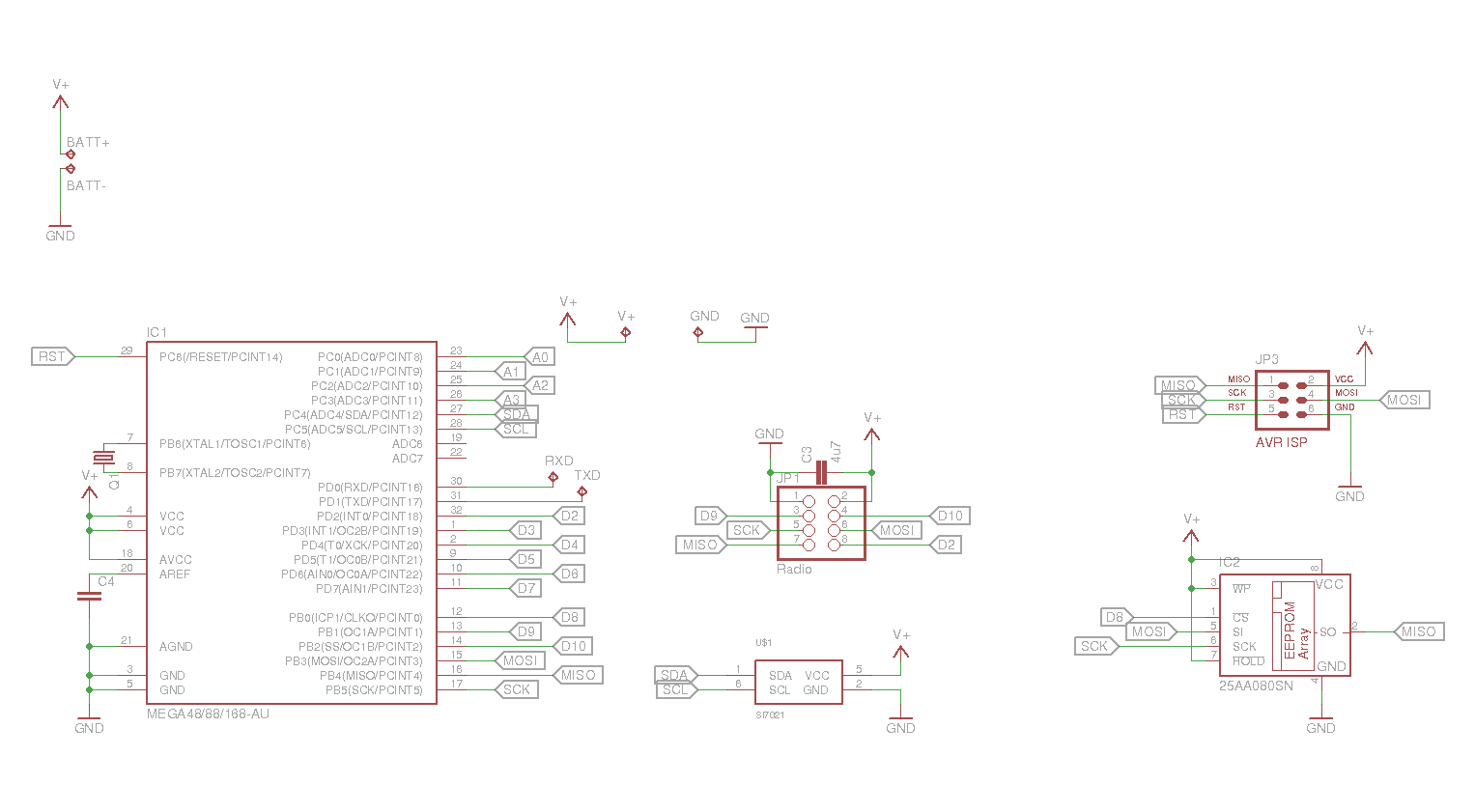
And the board as it is right now
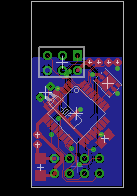
I know it says eeprom for IC2, but the footprint is the same for SPI flashes.
the eeprom is placed on the bottom layer. Also, the nrf24 is placed on the bottom (so the eeprom is "in the middle of the sandwich". The dimensions of the total board will be about 15x30mm. This is the same size as the radio module. The empty area on the top is the area below the antenna.
Still need to make changes to the DFN package (upper right). and make a footprint for a bmp180 barometric sensor (and find a good home for it on the board).
Also, need to tidy up the routing, I used the autorouter which is very bad at placing the traces (haven't got any better since I used eagle the last time 11 years ago..) So maybe I just end rip everything up and hand route it by hand (this is the fun part of pcb designs, trying to mingle everything in to place :) thinking about the things my teacers told me 20 years ago about PCB design (oh f*ck I feel like an old geezer now! :))
Oh yeah, btw. there is also made room for a crystal (32Khz) on there.
-
This will be a very small board indeed! Not an expert but couldn't the radio interfere with MCU at these short distances?
It would be more the other way arround. The MCU is making trouble for the receive path of the radio module. But the radio module has a large gnd plane on the bottom towards the mcu board, so it should be shielded.
-
A new schematic / layout
I'm almost ready for sending it off to China, and get some boards back :)
Changes since last:
2 LED's added (figured debug output could be nice)
pullups added on i2c bus
caps changed to 0603 footprint
added a couple of extra caps for decoupling (MCU)
Added BMP180 barometric sensor (only need 1 node with this one though)
Moved components arround, squeezing things a little bit more together.
Routed manually this time, not that big a board, so no need to use the autorute functionTestpads on upper right corner of the pcba is GND, RXD/TXD and VCC, again nice to have serial available for debugging the first couple of boards.
Board is designed with dirtypcbs.com in mind for production (Used their DRU file in eagle to check things).
Schematic:
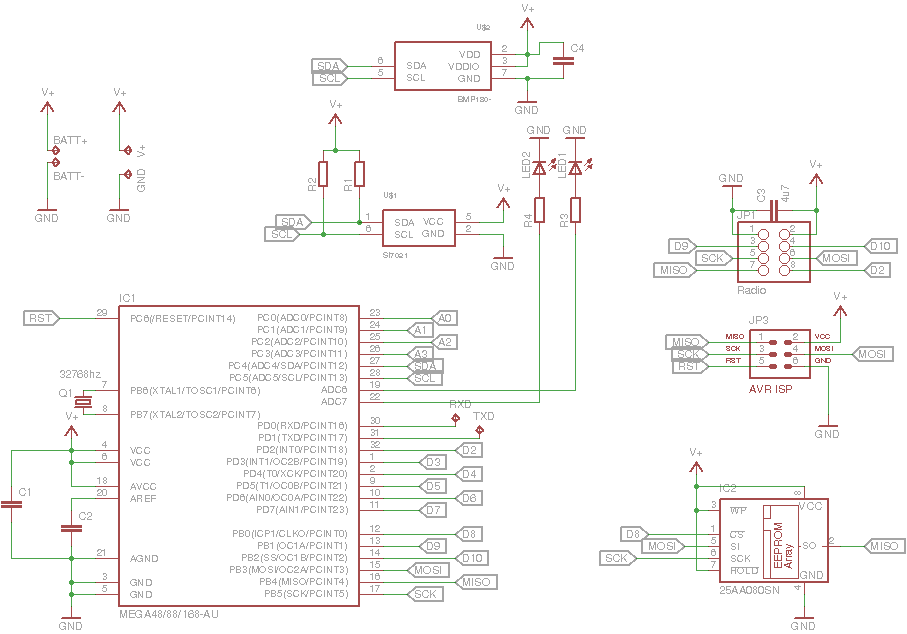
and pcb layout:
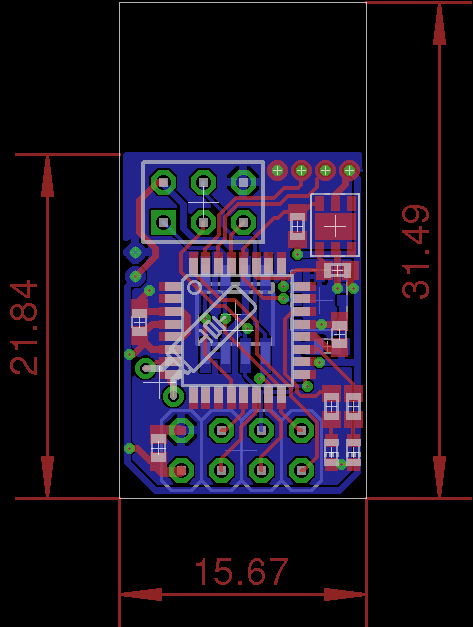
-
Fantastic! But I agree that is is perhaps a bit odd to have a footprint for a BMP180 on every board. You'll get a lot of boards when ordering 10x 5x5cm PCBs.
0603 ... time to get soldering. Haha. But those solder pads look pretty big actually. Is this the issue where Eagle actually makes 0603 caps more solderable than 0805 by making the pads longer?
-
Fantastic! But I agree that is is perhaps a bit odd to have a footprint for a BMP180 on every board. You'll get a lot of boards when ordering 10x 5x5cm PCBs.
0603 ... time to get soldering. Haha. But those solder pads look pretty big actually. Is this the issue where Eagle actually makes 0603 caps more solderable than 0805 by making the pads longer?
@bjornhallberg said:
Fantastic! But I agree that is is perhaps a bit odd to have a footprint for a BMP180 on every board. You'll get a lot of boards when ordering 10x 5x5cm PCBs.
I know, but I thought that I just as well could put one in there when I was designing the pcb. Otherwise I would have to get it on an external pcb (sparkfun sells bmp180 breakut boards). And there was room for it :)
0603 ... time to get soldering. Haha. But those solder pads look pretty big actually. Is this the issue where Eagle actually makes 0603 caps more solderable than 0805 by making the pads longer?
Don't know, last time I used eagle (about 10 years ago) I made layouts with 0805 components, (and an atmega8). Actually I think that the board I made back then is still being used in production.
/Thomas
-
Any thoughts on how to panelize it? You'd get like six boards on a 5x5 if those dimensions hold? Perhaps you could do some alternative layouts for different sensors? I understand dirtypcbs no longer do grooving (if they ever did) ... how much pcb space is lost to routing typically?
In case anyone else is wondering about dirtypcbs, they seem to do an ok job typically:
http://lab.kjlr.dk/p/handystick
http://hackers.gallery/236/electronics/pcb-itead-studio-vs-dirtypcbs -
The full size is 16x31 mm at the moment. So it's almost the same size as the normal nrf24 modules on ebay. So if I panelize them i can get 4 modules in total on a single 5x5 area.
Let's see when i come around to order them. I just like the dirty pcb as it reminds me of a song from my favorite rockband (ac/dc) :)
-
Arh.. just found out that the pinheader for the radio was turned 180 degrees, so instead of the 2 boards being on top of eatch other, they would "go in two different directions". Had to rip up most of the board, and re-arrange things again.
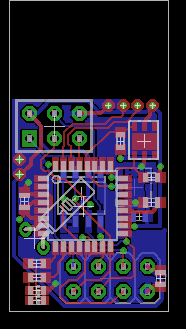
only changes on the schematic, is that the LED's are moved to a couple of other pins.
/ Thomas
-
Very interesting, this one board would cover all that I need for the majority of my sensors. Would need a couple of sensors with IR, and a couple of others. Is the reason for this the reduced foot print, a reduced cost over arduino pro's, or something else?
-
One of the reasons is that I wanted to go with battery, without all the extra "cruft" that is on standard arduino boards (like regulators etc.),
Also I want to make it as clean as possible, as I'm planning on creating 10-20 nodes in total I don't like to make them as "birdsnests" with multiple boards stiched together with wires.
It also almost became an obsesson to see how small I could get it :).
Maybe I can save a little $ by roling my own layout, but not the main driving force.
-
One of the reasons is that I wanted to go with battery, without all the extra "cruft" that is on standard arduino boards (like regulators etc.),
Also I want to make it as clean as possible, as I'm planning on creating 10-20 nodes in total I don't like to make them as "birdsnests" with multiple boards stiched together with wires.
It also almost became an obsesson to see how small I could get it :).
Maybe I can save a little $ by roling my own layout, but not the main driving force.
@tbowmo Ahh, understood! I too plan for, somewhere around 20 nodes. However I plan to wall wort power most of mine. The only real exception will be a few outside, and inconvenient to reach places.
I do like the idea of eliminating as much of the "birds nest" as possible... My first couple of, what I am currently calling prototype sensors, are, well inside their boxes, very ugly. haha.
-
@tbowmo Very nice design!
Personally I would make something similar but with the option to charge things using an external solar cell or just a charger. With the new generation of low-leakage NiMH rechargeable batteries I am very tempted using these to power the sensor.
-
Is it necessary to use solar power? A couple of standard AA batteries, is probably good for 2000mAh, and with a consumption of below 50uA, you got battery power for 4-5 years..
Also the sun doesn't shine inside my house ;)
/ Thomas
-
Is it necessary to use solar power? A couple of standard AA batteries, is probably good for 2000mAh, and with a consumption of below 50uA, you got battery power for 4-5 years..
Sounds great, 4-5 years without changing batteries but will that be real? The bad thing is that if true it take 4-5 years to prove it.
Also the sun doesn't shine inside my house
But a solar cell does not need solar to generate (some) current unless your house is completely dark ;-)
But yes, if it is only 2-3 year going with rechargeable batteries is overkill.
-
Is it necessary to use solar power? A couple of standard AA batteries, is probably good for 2000mAh, and with a consumption of below 50uA, you got battery power for 4-5 years..
Sounds great, 4-5 years without changing batteries but will that be real? The bad thing is that if true it take 4-5 years to prove it.
Also the sun doesn't shine inside my house
But a solar cell does not need solar to generate (some) current unless your house is completely dark ;-)
But yes, if it is only 2-3 year going with rechargeable batteries is overkill.
@daulagari said:
Is it necessary to use solar power? A couple of standard AA batteries, is probably good for 2000mAh, and with a consumption of below 50uA, you got battery power for 4-5 years..
Sounds great, 4-5 years without changing batteries but will that be real? The bad thing is that if true it take 4-5 years to prove it.
Probably not 4-5 years (it was just quick, off the head, calculations), but I would think that at least 2 years of service time should be obtainable.. But yes, we will first see it in a couple of years :D
Also the sun doesn't shine inside my house
But a solar cell does not need solar to generate (some) current unless your house is completely dark ;-)
But yes, if it is only 2-3 year going with rechargeable batteries is overkill.
I plan to place my sensors in corners, or somewhere else, where there isn't any direct light on them. And then they don't create enough power to charge the batteries., so solarpower is just adding to the cost of the project, without any real benefit..
-
Woah, wait.... 2 years of power?? Okay, if I could even get, say 18 months, I would go with battery powered over wall worts in a majority of my sensors.
I was assuming battery power may last 3-6 months or so, given the motion detection.
